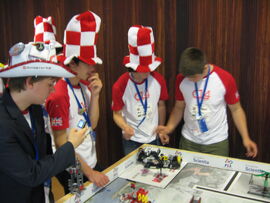
C14 Robotics Team (Home Ed), who won the LEGO Robotics National Championships
GCSE/IGCSE Design and Technology is not normally an option for home-educated students, and neither are vocational product design qualifications, but there are alternative ways to develop your interest in this subject and gain recognition for what you have learned.
Can private candidates take GCSE Design and Technology?[]
GCSE D&T is theoretically offered to private candidates by OCR and Edexcel exam boards (AQA states explicitly that its GCSE DT is not available to private candidates).
However, GCSE D&T has a large coursework element, 50% of the marks are for the project and portfolio. You cannot take the exam without doing the project. In order to do the GCSE, you need an exam centre which would enter you for the project. Most exam centres will not do this because of the time involved.
However, you may find one in your area which is prepared to consider it, for example if a teacher at the school were to run a class outside of school hours for home-educated children as a private tutoring arrangement, and arrange to submit their projects through the school. We do not know of any home educated children who have been able to take GCSE DT, however. If you are aware of any, please do leave a comment below or post on the HE Exams facebook group.
CAIE IGCSE Design and Technology is not available to private candidates.
What can you do instead of GCSE Design and Technology?[]
If you may want to study Design and Technology, Engineering, or Product Design later on, look at some courses on college websites and see what the admissions requirements are, so you know what you need to work towards. The core qualifications which would be most useful are:
In addition, these subjects may be useful:
- Arts Awards may be able to incorporate some DT-style projects; talk to an arts awards advisor.
- Computer Science / IT
- Level 2 Certificate in Creative Craft
Here are some further suggestions from the HE Exams group:
Computer-Aided Design Software (CAD)[]
Learn to use CAD software and build a portfolio of designs. Some programs, are free to use and you can find free online courses in them, eg Alison.com
Building a Design Portfolio[]
Do your own designs and builds. Take photos. Write up what you did. You could follow the format of the Design and Technology GCSE projects- you'll find plenty of resources online advising on GCSE DT projects, eg Mr DT.com . Critique your designs; write about what you'd change if you did it again. This gives you a portfolio which you can show to college tutors to demonstrate your commitment to the subject.
Courses and Classes[]
NCFE courses in Creative Craft are offered online by Technology Triumphs. These courses have been designed by a DT teacher and are increasingly being accepted in place of DT GCSE's by colleges. As with all alternative qualifications if you want to use them as GCSE equivalents do check with college that they will be accepted.
Smallpeice Trust runs very popular engineering and design courses for young people. Most of these are short residential courses and they book up fast. eg: "The Smallpeice Trust run some excellent residential courses for engineering and computing. Not cheap, but heavily subsidised I believe, and good value for the experience. My son did a free residential course in Cybersecurity with Cyberfirst. It was excellent. "
Community Workshops, Maker Meets and other local initiatives may give you the opportunity to learn from others.
Check Hackspace to find some community workshops in your area.
Evening classes at adult education college may occasionally accept teenage students.
College at 14-16[]
Some colleges accept 14-16 year-olds to study vocational subjects, which may include Design and Technology or other product design or engineering courses. What's available varies by area, but it can include:
Part-time classes for home-educated teenagers[]
Any Further Education college can accept home-ed teenagers to fill empty places in its classes part-time, but many aren't aware of this. See College for 14-16 year olds for details.
Full-time college at 14-16[]
A small number of Further Education colleges nationwide offer a full-time course for 14-16 year-olds who would otherwise be at school. Colleges have to meet certain conditions to be allowed to do this and it is a major undertaking for them. You can read more about the differences between this scheme and the home-ed part-time scheme on the College for 14-16 year olds page. A list of the colleges which currently offer 14-16 recruitment is available via the Department for Education.
UTCs - University Technical Colleges[]
UTCs - University Technical Colleges - are specialist colleges that take people from 14-19 full-time. There are some which specialise in engineering and/or product design. They were set up with the intention of providing high quality German - style technical education and they're just getting established in the UK. They vary a lot and some have been through teething problems in their first few years, while others are more established. At 16+ they can allow you more flexibility than most institutions, eg combining A-levels with Btecs or other vocational qualifications. Schools tend not to publicise them as an option as they compete for pupils. See the UTColleges site to find out if there are any near you.
Apprenticeships[]
Apprenticeships are strictly for ages 16+ - read about them on the Apprenticeships page. Some colleges offer 'pre-apprenticeship' courses, which are intended to build up skills for people who want to be apprentices but aren't ready for a job yet. These are usually aimed at ages 16+.
Comments from Home Educators[]
One home-educating parent comments:
DT is not realistically do-able as a home ed student, but it's possible to find plenty of alternative things to add to a CV.
For example, my son spent two years competing with a LEGO robotics team and once he was too old to compete he helped out at some of the regional competitions. He attended a local digital youth club for several years which gave him some good technical projects to add to his CV.
He's had work experience with a software company, via a friend who worked there, at a robotics research organisation, through another friend and at BMW (that was through his sixth form - and his least favourite experience).
A friend's son did some back-stage lighting projects with a local theatre after-school class before going on to do a BTEC in engineering.
There are lots of engineering apprenticeships on offer, post 16. If you do A levels or a level 3 BTEC you also have the option of applying for a degree apprenticeship, where you get paid and have your degree paid for. My son is (fingers crossed) doing this with the software company he did work experience with.
